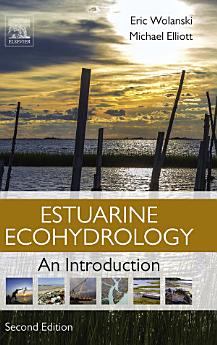Estuarine Ecohydrology: An Introduction, Edition 2
Aug 2015 · Elsevier
Ebook
322
Pages
family_home
Eligible
info
reportRatings and reviews aren’t verified Learn More
About this ebook
Estuarine Ecohydrology, Second Edition, provides an ecohydrology viewpoint of an estuary as an ecosystem by focusing on its principal components, the river, the estuarine waters, the sediment, the nutrients, the wetlands, the oceanic influence, and the aquatic food web, as well as models of the health of an estuary ecosystem. Estuaries, the intersection of freshwater and coastal ecosystems, exhibit complex physical and biological processes which must be understood in order to sustain and restore them when necessary. This book demonstrates how, based on an understanding of the processes controlling estuarine ecosystem health, one can quantify its ability to cope with human stresses. The theories, models, and real-world solutions presented serve as a toolkit for designing a management plan for the ecologically sustainable development of estuaries. - Provides a sound knowledge of the physical functioning of an estuary, a critical component of understanding its ecological functioning - Ideal reference for those interested in marine biology, oceanography, coastal management, and sustainable development - Describes the essentials behind conceptual and numerical models of the health of an estuary ecosystem and how to use these models to quantify both human impacts and the value of remediation and management measures - Chapters are written in an accessible way that encourages collaboration between aquatic, marine, and wetland biologists, ecologists, oceanographers, geologists, geomorphologists, chemists, and ecosystem modelers - Covers the physical, chemical, and biological elements of estuary environments, indicating that the essence of an estuary's functioning lies in its connectivity with the adjacent catchment and the marine/coastal system
About the author
Professor Eric Wolanski is an estuarine oceanographer at James Cook University and the Australian Institute of Marine Science. His research interests range from the oceanography of coral reefs, mangroves, and muddy estuaries, to the interaction between physical and biological processes determining ecosystem health in tropical waters. He has 370 publications and reports. Eric is a fellow of the Australian Academy of Technological Sciences and Engineering, the Institution of Engineers Australia (ret.), and l'Acade ́mie Royale des Sciences d'Outre-Mer. He was awarded an Australian Centenary medal, a Doctorate Honoris Causa by the Catholic University of Louvain and a Lifetime Achievement Award by the Estuarine & Coastal Sciences Association. Eric is an editor-in-chief of Estuarine, Coastal and Shelf Science, Wetlands Ecology and Management, and the Treatise on Estuarine and Coastal Science.Eric is a member of the editorial board of Journal of Coastal Research, Journal of Marine Systems, Ecohydrology and Hydrobiology, and Continental Shelf Research. He is a member of the Scientific and Policy Committee of the Japan-based International Center for Environmental Management of Enclosed Coastal Seas, a Visiting Professor at the Chinese Academy of Sciences, and a member of the College of Experts of the Australian Research Council.Professor Michael Elliott is the Director of the Institute of Estuarine & Coastal Studies (IECS) and Professor of Estuarine and Coastal Sciences at the University of Hull, U.K. He is a marine biologist with wide experience in teaching, research, advisory and consultancy work in estuarine and marine aspects of ecological components and communities, and the impacts of human activities, as well as policy, governance, and management of estuaries and coasts. He is a Fellow of the Royal Geographical Society and of the Society of Biology. Mike has published widely, coauthoring/coediting 15 books and contributing to over 200 scientific publications, which includes coauthoring The Estuarine Ecosystem: ecology, threats and management (with DS McLusky, OUP, 2004), Ecology of Marine Sediments: science to management (with JS Gray, OUP, 2009), and as a volume editor and contributor to the Treatise on Estuarine & Coastal Science, Elsevier, Amsterdam (Eds.-In-Chief E Wolanski & DS McLusky).Mike has acted as an advisor on many marine and estuarine environmental matters for academia, industry, government, and statutory bodies in Europe and elsewhere. Mike is a past-president of the international Estuarine & Coastal Sciences Association (ECSA) and is also one of the four editors-in-chief of the international journal Estuarine, Coastal & Shelf Science and on the editorial board of Marine Pollution Bulletin. He is the Sir Walter Murdoch Distinguished Adjunct Professor, Murdoch University, Australia, and also has adjunct professor and research positions at Klaipeda University (Lithuania), the University of Palermo (Italy), and the South African Institute for Aquatic Biodiversity, Grahamstown. From 2014, he was appointed an independent non-executive member of the UK Marine Science Coordinating Committee and member of the Science Advisory Board of Marine Scotland. In 2014, Mike was awarded the Laureate of the Honorary Winberg Medal of the Russian Hydrobiological Academic Society.
Rate this ebook
Tell us what you think.
Reading information
Smartphones and tablets
Install the Google Play Books app for Android and iPad/iPhone. It syncs automatically with your account and allows you to read online or offline wherever you are.
Laptops and computers
You can listen to audiobooks purchased on Google Play using your computer's web browser.
eReaders and other devices
To read on e-ink devices like Kobo eReaders, you'll need to download a file and transfer it to your device. Follow the detailed Help Center instructions to transfer the files to supported eReaders.





